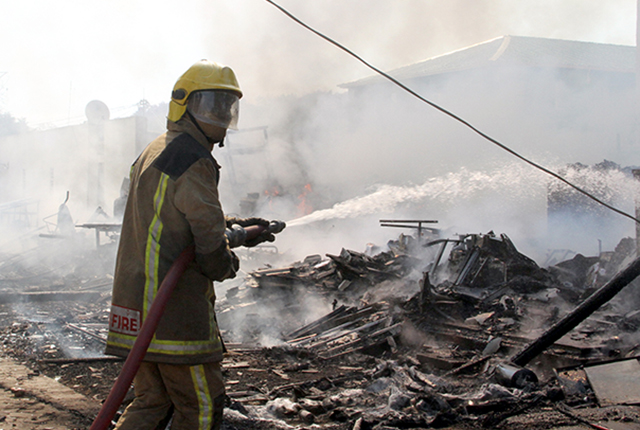Fire departments ‘disaster’ mode

Lovemore Meya Herald Correspondent
The fire departments in the country’s major towns and cities have no capacity to handle major fire incidents as they are ill-equipped, understaffed and poorly funded, exposing human life and property to danger in the event of inferno outbreaks. A survey conducted by The Herald revealed that some towns do not have functional fire tenders, with the second highest urban population, Chitungwiza, having one fire engine, while the fire department operates without a single radio for communication and no ambulances.
The capital, Harare, has 15 working fire tenders, but only three aerial ladders for use on tall buildings.
City of Harare emergency services assistant chief fire officer Mr Lovemore Mafukidze said: “We have 20 fire tenders and only 15 are functional, five aerial ladders, with only three functional, 14 specialist functional vehicles and 14 ambulances and out of the total, 10 are working.
“Three sub-stations in Kuwadzana, Waterfalls and Greendale are each equipped with a single fire tender.”
Chitungwiza puts the lives of close to a million residents in danger as its fire station is literally grounded.
Chairperson of the caretaker commission appointed by Government to look into the welfare of the local authority, Mr Madzudzo Pawadyira, said it was a sorry state of affairs.
“The fire brigade is in a state of disrepair, it is really frightening to think that we have a fire department that is fairly nominal when we have close to three quarters of a million people relying on that service for emergency responses and fire,” he said.
“They have one functional fire engine which was recently acquired through donation and we have another one which can be repaired through cannibalisation of the old fleet that is there.
“I appreciate that fire engines are expensive. We ought to ensure that sufficient funds are set aside for the fire brigade. They do not have radio communication, which is best for communication with vehicles that are in the field.
“They do not have connectivity by radio with City of Harare which may be required to come in cases of serious emergencies and any connectivity with the airport for which they could be required to offer some support.”
In Beitbridge, town secretary Mr Loud Ramakgapolo said they only have one functional fire tender.
“We have two fire tenders, one big and a small one which does not count since in cases of emergencies we collaborate with the Zimbabwe Revenue Authority (zimra) and National Oil Company of Zimbabwe (noczim),” Mr Ramakgapolo said.
Mutare City engineer Mr Donald Nyatoti said while they had three fire tenders, two were down.
Gweru chief fire officer Mr Emmanuel Musemwa said they had a single fire station.
“We have five fire tenders, excluding a command car, two functional, three down due to spares,” he said. “Ambulances are six, all functional, but their efficiency level has declined.”
Masvingo has four fire engines — three functional, one down — and one rapid intervention vehicle which they use to attend to road traffic accidents, together with three ambulances.
Bulawayo’s chief fire officer Mr Richard Petersen said they were fully equipped with all emergency appliances and prepared to attend to any emergencies.
“We have four fire stations, all fully manned,” he said. “Out of the four, our main station is Famona which is our headquarters and is fully equipped with all vehicles and appliances for any emergencies.
“The remaining substations have one appliance and an ambulance with the exception of Nketa, which is the headquarters for ambulance division. We have 11 ambulances; eight are functional, while three are in the workshop.”
Local Government, Public Works and National Housing permanent secretary engineer George Mlilo said local authorities should invest more in service delivery, including fire fighting equipment.
“Our position as Government is that revenue collected should be 30 percent salaries and the remaining 70 percent is for service delivery,” said Eng Mlilo.
“The potion for service delivery include the purchasing of refuse trucks, road patching equipment, fire tenders and ambulances, it should be coming from the 70 percent. We have been receiving a lot of fire tenders as Government for local authorities through donations.”
Eng Mlilo said local authorities should be pro-active in ensuring that such equipment was readily available.
“Local authorities should solicit for funding, asking for borrowing powers to buy the equipment,” he said.








Comments